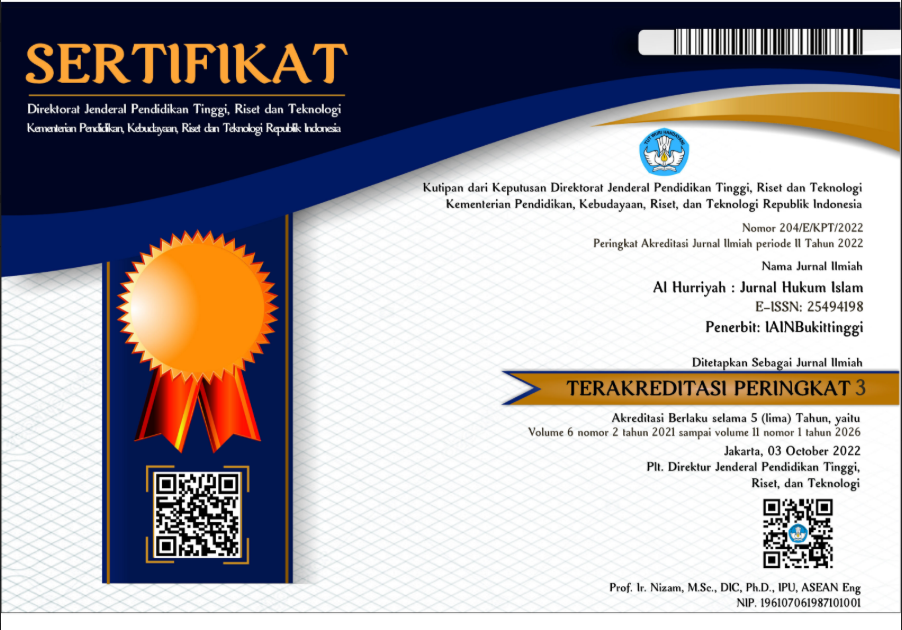HUKUM MENGULANG SHALAT DENGAN BERJAMA’AH (STUDI PEMAHAMAN HADIS MUKHTALIF)
DOI:
https://doi.org/10.30983/alhurriyah.v3i2.715Abstract
I’adah (repeating prayer) is to repeat the implementation of an obligation in time according to the provisions of the sharak for the second time due to the occurrence of shortages or aging in the implementation of the first obligation. In the matter of repeating this prayer, the existence of the traditions of the Prophet Muhammad explained about the ability to repeat prayers in congregation, meaning someone who had prayed at his house, then he went to the mosque and found a congregation who would pray, he was allowed to repeat pray by joining the congregation. However, in other traditions, indications of prohibition were found to repeat the same prayer on one day even with congregations. The two versions of the hadith appear to be textually contradictory, but as Imam Shafi'i's statement states that the traditions of the Prophet Muhammad will not be contradictory, a solution can be found so that a proper understanding of the traditions that appear to be contradictory can be found. Therefore, it is necessary to analyze a complete understanding of the traditions of repeating prayers in congregation so that the law can be repeated in congregation.
References
Abdurrahman bin Abdurrahman al Mubarakfuri, Abu Alula Muhammad Tuhfath al-Ahwadziy Syarah Sunan al-Tirmidziy, Penerjemah Shafaul Qalbi, Jakarta: Pustaka Azzam, 2008
Abdurrahman bin Abi Hatim Muhammad bin Idris bin Mundziral Tamimy al-Hanzuly Abu Hatim, Imam Hafiz Syaikh Islam Abi Muhammad , Kitab al-Jarh Wa al-Ta’dil, Mesir : Dar al Kutub, 1953
Abi al-Hajaj Yusuf Bin Abdurrahman al-Mizzi, Imam al-Hafidz Jamaluddin Tahzib al-Kamal fi asmai al- Rijal, Dar al-Fikr, Beirut-Lebanon, 1414 H/ 1994 M
Abi Bakr Al-Suyuthi, Jalaluddin Abdurrahman, Al-Jami’ al-Shagiir fi Ahaadits al-Basyiir al-Naziir, Indonesia : Maktabah Daar Ihya Al-Kutub Al- ‘Arabiyyah, t. th.
Al-Dimasqi, Imam Abu Zakariya bin Yahya bin Syaraf an Nawawi Raudhath al-Thalibin, Penerjemah Muhyidin, Abdurrahman Siregar, Moh Abididin Zuhri, Jakarta: Pustaka Azzam, 2007
Al-Farmawi, Abd al-Hay. Al-Bidayah fi al-Tafsir al-Maudhu’iy t. tp. : Matba’ah al-Hadarah al-‘Arabiyyah. 1997
Al-Munawwir, Kamus al-Munawwir Arab- Indonesia Terlengkap, Surabaya: Pustaka Progresif, 1997
Buchari, Metode Pemahaman Hadis, Jakarta: Nuansa Madani, 1999
Edi Safri, Edi Al-Imam al-Syafi’i : Metode Penyelesaian Hadis-Hadis Mukhtalif, Padang, IAIN IB Press, 1999
Hanbal, Ahmad bin, Musnad Ahmad Bin Hanbal, Beirut: Dar al-Fikr, t. th.
Ibn Manzhur, Muhammad Ibn al Mukarran Lisan al-Arab al-Muhith, (Beirut: Dar Lisan al-Arab, t. th.
Khaeruman, Badri, Otentisitas Hadis, Bandung: PT Remaja Rosdakarya, 2004
Maizuddin, Metodologi Pemahaman Hadis Padang: Hayfa Press, 2000
Muhammad Ajaj al-Khatib, al-Sunnah Qabla al-Tadwin, al-Qahirah: Maktabah Wahbah, 1975
Salim, Peter, Kamus Besar Bahasa Indonesia Kontemporer, Jakarta: Moderen English Press, t. th.
Sabiq, Syeikh Sayyid, Fiqh Sunnah, Qahirah: Dar al-Fikri, 1365
Sulaiman bin al-Ats’atsi al-Sajastani, Imam Hafiz Abi Dawud, Sunan Abi Dawud, Beirut : Dar al-Kutub al-‘Alamiyah, 2005
Tim Penyusun Kamus Pusat Pembinaan dan Pengembangan Bahasa, Kamus Besar Bahasa Indonesia, Jakarta: Balai Pustaka, 2007
Wensink, Arnold. J. Mu’jam al-Mufaharas li Alfazh al-Hadits al-Nabawi, Leiden, E.J, Brill, 1969
Yunus, Mahmud. Kamus Arab-Indonesia. Jakarta: Yayasan Penyelenggara Penterjemah Penafsir Al-Qur’an. 1973
Zulhedi, Hadis- Hadis yang Bertentangan, Jakarta: Nuansa Madani, 2001
Downloads
Published
How to Cite
Issue
Section
Citation Check
License
Authors who publish with this journal agree to the following terms:
- Authors retain copyright and grant the journal right of first publication with the work simultaneously licensed under a Creative Commons Attribution-ShareAlike 4.0 International License that allows others to share the work with an acknowledgment of the work's authorship and initial publication in this journal.
- Authors are able to enter into separate, additional contractual arrangements for the non-exclusive distribution of the journal's published version of the work (e.g., post it to an institutional repository or publish it in a book), with an acknowledgment of its initial publication in this journal.
- Authors are permitted and encouraged to post their work online (e.g., in institutional repositories or on their website) prior to and during the submission process, as it can lead to productive exchanges, as well as earlier and greater citation of published work (See The Effect of Open Access).





